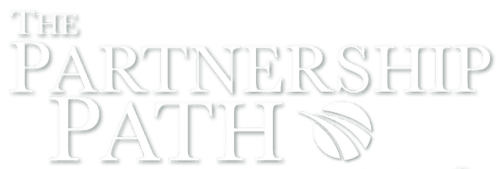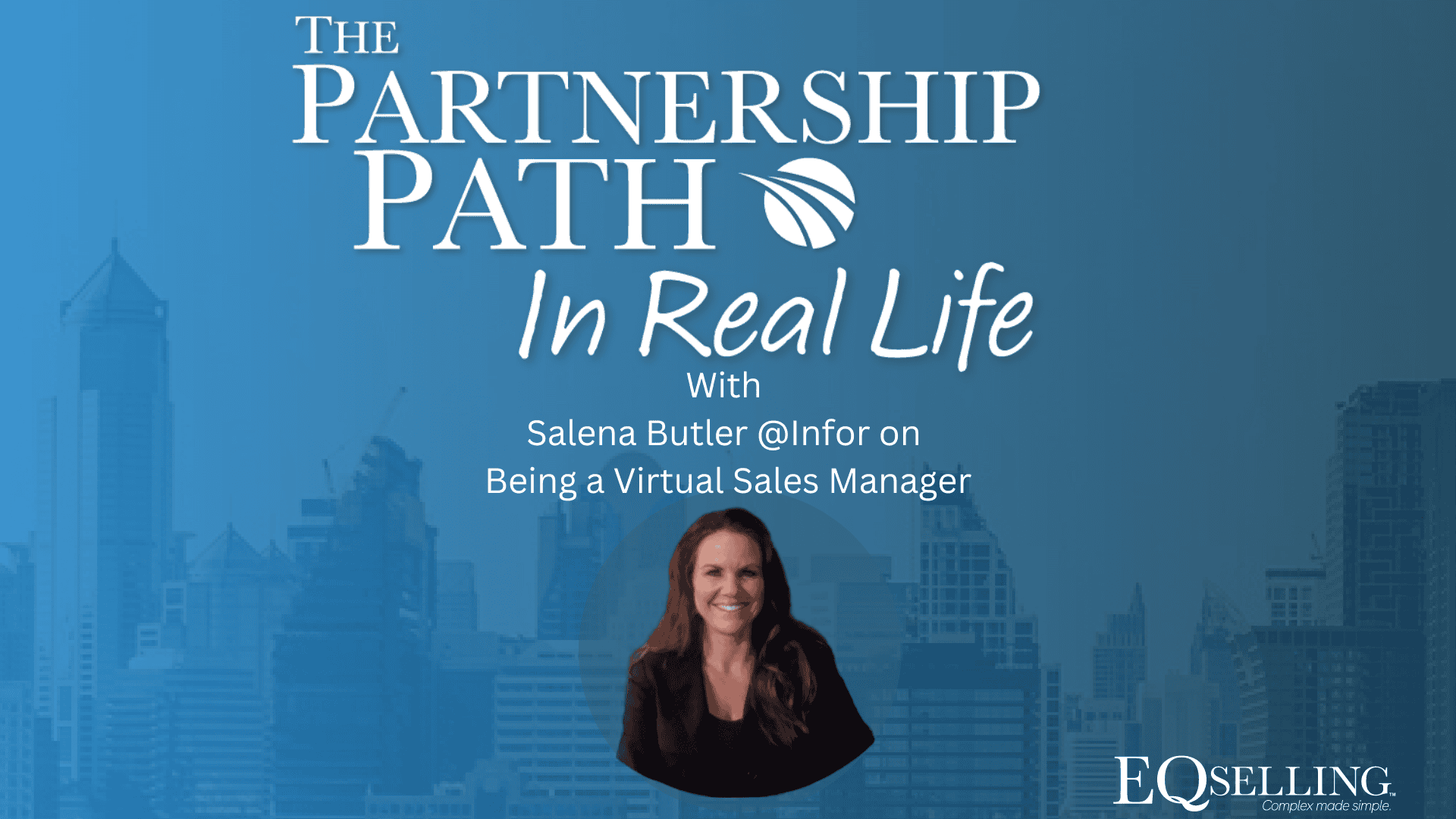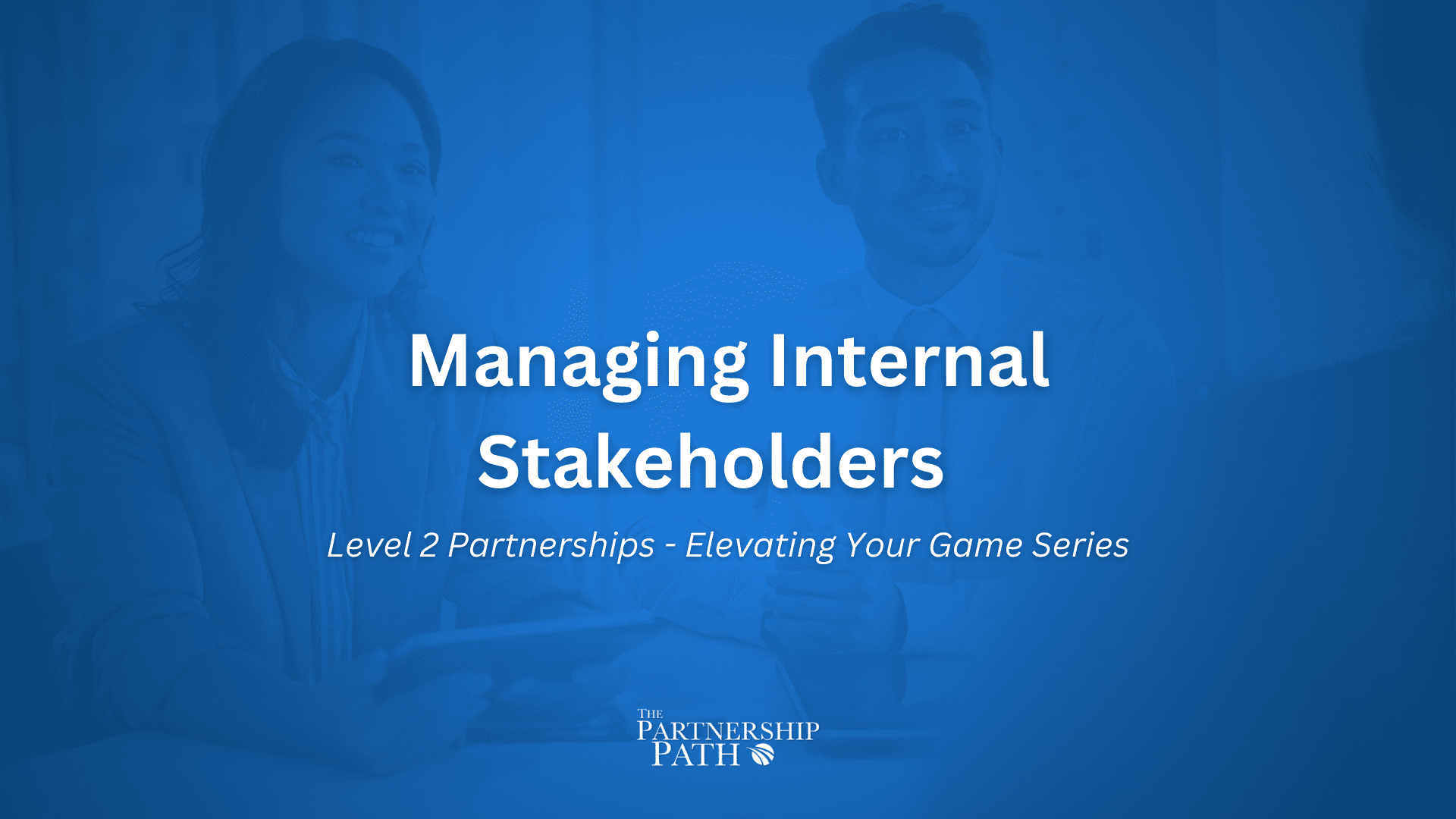Main Episode
Being a Virtual Sales Manager
Episode Summary
Ever felt like you were juggling communication, business relations, and authenticity all at once? In the latest episode of “The Partnership Path”, hosts John Rudow and Toni Kent peel back the layers on virtual sales management, discussing the crucial role of authentic communication and relationship-building in sales.
Whether you’re a seasoned sales manager or a partner struggling to manage your sales force, this conversation is an enlightening exploration of techniques to bridge gaps between methodologies and foster meaningful partnerships. This episode is invaluable for anyone looking to enhance their partner relationships and improve sales effectiveness through authentic engagement.
Transcript
John (00:02)
Hey Toni, here we are at another episode of The Partnership Path.
Toni (00:07)
I just saw about, you said one of the in real life guests and her Kermit moment and I felt like doing a yay! Slippin’ on my picture.
John (00:19)
I was thinking since our last conversation about you, I’m such a big fan of yours and I’m not sure our listeners know that you did this kind of work around partner management and stuff for a long time and then you used that as a way to launch into something very, very different. And I’m curious what you learned
Toni (00:41)
Yeah.
John (00:49)
from being a channel manager or partner manager, you know, that experience that you leverage in what you do today as a speaker, an author, a comedian, like, was that like, can you look back and say, hey, there’s certain things that I did there that actually kind of helped me be better at what I do now.
Toni (01:03)
Yeah.
I guess, I suppose, honest communication is at the heart of everything. And actually what I did discover was when I tried to be something that I wasn’t, when I thought I must be very corporate and I must be like this, it didn’t resonate with people as much, which was a steep learning curve for me, actually, because obviously in business you have to.
John (01:37)
Yeah.
Toni (01:44)
be professional, you know, but you can be professional whilst also allowing people to get to know you. And yeah, being authentic. I learned a lot about speaking in front of groups of people and, you know, how to do that. And I learned that you definitely don’t want me on stage talking about virtualization, but I absolutely could talk about…
John (01:53)
being authentic.
Toni (02:14)
corporate culture, about the tension between sales and marketing. And I learned loads of great lessons just about kind of, I don’t know how to get along with people, work with different sorts of people, influence people. Yeah. Yeah. And I also learned that when you go to partner conference, if you know the good places,
to go, you’d be very popular.
John (02:48)
That’s a key skill. Big.
Toni (02:49)
It’s very important. Do you know what, actually, if you can connect people or connect with people, that is a big thing for me. I’m really good at connecting people. I’m very good at connecting with people. And if you can do those two things, they’ll set you up in all sorts of different career paths. Yeah.
John (02:58)
Yeah. Yeah.
Yeah, I think that’s great. And I think actually that point, being able to connect with people kind of in an authentic way, you know, because I mean, that’s really the only way to connect with people is to be who you authentically are. And your ability to do that lets you influence, help, be…
Toni (03:17)
Hmm.
Yeah.
Hmm.
John (03:34)
valuable to them in a whole lot of ways, right? It kind of starts with that sort of personal thing. I think it’s where, from a channel management perspective, I think that’s where people start to say, oh, it’s a relationship job. Not really, but it certainly starts there, right? It’s really hard to do a lot of the stuff we want to do without building relationship. And so it definitely starts there. And today, we wanted to talk today,
Toni (03:47)
Yeah.
Hmm.
John (04:02)
I think that’s actually a really good kind of segue into what we wanted to talk about today, which is about being a virtual sales manager over the partner’s sales force, whether that’s over their individual salespeople or over their sales management team or whatever, you have this opportunity and kind of a requirement sometimes to help the partnership.
Toni (04:09)
Hmm.
John (04:30)
move forward by helping your partner be better at running deals, at asking customer questions, at pushing back, at negotiating, all those kind of opportunity management types of things, which requires you to be a bit of a sales manager over people who don’t work for you. And that’s not an easy thing to do.
Toni (04:46)
Hmm.
Hmm.
No, and a phrase sprung to mind as you were talking, actually, I was thinking about like soft influence. So how do you, because that was something which I managed teams previously. And some of the ways in which I might help them be more successful would be by helping them develop their skills.
John (05:04)
Yeah.
Toni (05:26)
So I might go on a course that my team could not go on, but I would go back and deliver a, you know, bite sized version to pass that on, which helped them to be more effective. Um, but I think in that sales scenario and specifically looking at things like deals and pipeline, I would love to hear from you how you might.
John (05:26)
That’s right. Yeah.
Toni (05:52)
do that because that is slightly different I think to some of the work that I did.
John (05:57)
Yeah, yeah, I do think this applies to a kind of a very specific segment of partnering, right? It’s generally true where you have a vendor that is working with resellers who are often perhaps smaller organizations, almost always smaller organizations than the vendor themselves and sometimes very small organizations. And to some degree working with alliance partners who are
Toni (06:05)
Mm.
Mm.
Hmm.
John (06:27)
not really selling your stuff, but they’re heavily influencing the purchase of your stuff. So it doesn’t apply to everybody. It’s not every channel relationship, but I think the trick here, I don’t know if it’s really a trick, but I think the skill here is to kind of develop your own opportunity language that you can use that would apply to any deal.
Right. And we use kind of a kind of an eight category conversation. Right. I mean, there’s the basics of, you know, who’s the deal, who are we selling to? What are we selling? When’s it going to close? What, you know, kind of where in the sales cycle do you think it is? But but then you want to have a more generic language that you can use with people because they have their own sales methodology. They have their own sales process. They have all right. They have all that.
Toni (07:09)
Yeah.
John (07:24)
and you have your own and they aren’t the same. And so you have to find this kind of bridging language, right? And I think one of the ways you do that is by kind of defining the categories that represent risk in a deal. And then querying the partner sales person or sales manager or whoever it is you’re talking to about those risk categories. So you might say something like,
Toni (07:26)
Yeah.
Hmm.
Mm -hmm.
John (07:54)
Hey, so on this deal, in terms of how well we understand what the customer really needs and how well our solution, our combined solution meets that need, kind of where would you put the risk? Even if it was like maybe a red, green, yellow. Like, do you think we’re red on that? You think we’re yellow on that? You think we’re green on that? Right? It’s a really nice un -methodology language that I can use. So I cover need.
Toni (08:12)
Yeah.
Mm.
John (08:23)
I might say, well, okay, let’s talk about the people involved in terms of like understanding like at the customer who’s making the decision and who matters in that decision. Kind of where do you think we are risk wise? Do we have a lot of risk, a little risk or no risk? In terms of having access to those people, do you think we have a lot of risk, little risk, no risk? In terms of the competition and our ability to present a…
Toni (08:39)
Yeah.
John (08:51)
compelling value proposition that differentiates us. A lot of risk note, right? And I personally have eight categories that I use on every deal. And it doesn’t matter whether you’re a challenger sales guy, you’re a solution selling guy, you’re a Miller -Heimann guy, it doesn’t matter, or a never had a methodology in my life kind of guy. We can use those questions to kind of bridge the conversation, right? And I think as a
Toni (08:54)
Mm.
John (09:20)
partner or channel manager, you got to develop that and have a really good kind of common set of questions that you ask that aren’t intimidating, but get at the heart of the matter so that you can then figure out how can I help that person move the deal forward? And even those questions actually start to teach someone who’s not very good at selling how to think differently about their deals.
Toni (09:23)
Mm.
Mm.
Mm.
I really love that. I just, because it’s not that is it 60 % or is it 40 %? Yeah, it completely removes, yeah, it removes that. Yeah, yeah, it and it takes away that, you know, I’m not your boss, but I’m going to ask you to show me your pipeline and explain where you’re at. I really like that.
John (09:53)
Yeah.
Yeah, yeah. And what does that even mean? If a deal is 60%, what does that even mean? Yeah.
Yeah. Yeah.
Toni (10:16)
Wow.
John (10:16)
I think one of my favorite recommendations to people in terms of how to do that in a way that’s unassuming is to take a weekend and binge watch the old Colombo TV show.
Toni (10:24)
Mm.
I just think you can say that. Wait a minute.
John (10:35)
Because he was like this totally unassuming guy, right? Peter Falk was so good at so… Wait a minute. Like he was kind of stupid, but he wasn’t. But he was able to ask these really probing questions in a way that like wasn’t offensive to the person he was asking. And he got tons of information that way. And I think that’s, you know, it takes a lot more work. But…
Toni (10:39)
Yeah.
Yeah.
Yeah.
Mm. Mm.
Yeah.
John (11:02)
Like that’s what you want to model is the Columbo detective. So the gun was in her hand and the bullet hit, you know, like, you know.
Toni (11:10)
I’m going to go ahead and close the video.
Yeah. Yeah. That’s good. I kind of, and like you say, it is that getting someone to ask themselves a question in a way that is non -intimidating. So if we were then to look at that, I’ve had a meeting with my partner and we’ve gone through the pipeline and then you’re taking that back into your business.
John (11:24)
Yeah, that’s right.
Toni (11:42)
You’re then able to kind of present what you see as the risks as being. Yeah, yeah, I like that. I think that’s cool. I would like to know what else people are using.
John (11:55)
I mean.
I would too. I would love to hear how people are sort of overcoming that challenge of differing sales methodologies, differing language. How do you talk about deals? Because we have to talk about deals. And so how do I do that in a way that number one, bridges the gap, but number two is unassuming and doesn’t…
Toni (12:09)
Mm. Yeah.
Yeah.
John (12:26)
It gets at that whole influence without authority, the soft influence type of things. How do I help my partner be better at selling than they are today? Because, I mean, there’s a big assumption in that, right? That I’m a better seller than my partner, and that may not be true. And so that may not always apply. But my experience is for the scenarios we’re talking about, that is often true.
Toni (12:31)
Yeah.
Yeah.
Mmm. Mmm.
John (12:54)
And so we have to find ways to do that without being arrogant and telling our partner, you suck at selling. That’s just not helpful, right? So we have to do that. And I can’t wait to hear how people are actually overcoming that in real life.
Toni (13:04)
No.
Yeah, yeah. Well, I’ve got a whole new framework for thinking about sales pipeline risk and I’m going to have to go out and buy a Mac. Did Colombo wear a Mac?
John (13:27)
Yeah, I guess that’s, is that what it was called? That raincoat? And you gotta start smoking cigars.
Toni (13:30)
A raincoat. Yes, definitely. No, terrible idea. That was great, John. Thank you.
John (13:36)
Awesome. All right. Yeah, we’ll see what the community has to say and then we’ll come back for more of this Go To Market Together series soon.
Toni (13:46)
Right, thanks John.
Key Takeaways
- Authenticity is Key: Successful partner management hinges on honest and authentic communication. Trying to fit into a mold can detract from effectiveness.
- Influence without Authority: The ability to influence partners without direct authority is a subtle but powerful skill in managing partnerships.
- Understanding Risk Categories: Defining risk in deals can help foster clear communication and better understanding between partners.




